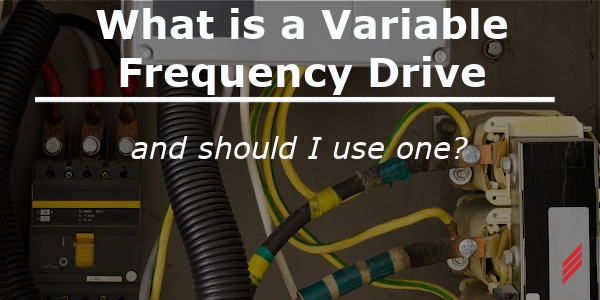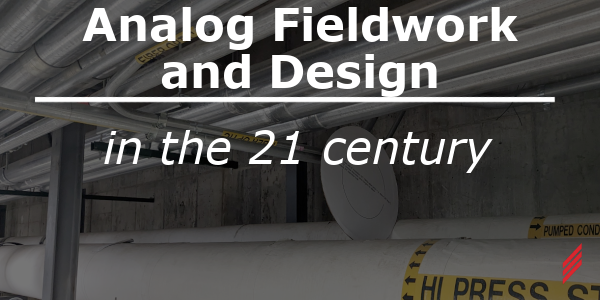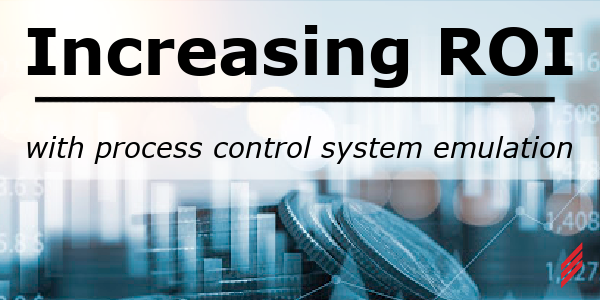What is a Variable Frequency Drive, and Should I Use One?
by Steven Johnson on May 30, 2024 10:30:00 AM

Variable Frequency Drives are a relatively newer piece of electrical equipment that can help save money, improve efficiency, and protect motors to increase lifespan. To help answer whether a VFD is a good choice for your applications, let’s take a look at what a VFD is, how they are helpful, and a few cases where they may not be practical.
What is a Variable Frequency Drive?
Optimization and efficiency are key factors that drive profitability, and the VFD is an elegant device that can be used to achieve high levels of both. The VFD regulates the speed, torque, and output of an electric motor by varying the frequency and voltage that is being supplied to a motor. Let’s take a very broad look at how a VFD achieves this:
- Input Stage
The VFD uses a rectifier to convert the supplied alternating current (AC) to direct current (DC).
- DC Bus
The supplied AC voltage has a sinusoidal waveform which resembles a “ripple” that is not desirable for precise control. Adding a capacitor to the DC bus absorbs and stores this energy and then delivers a smooth DC voltage.
- Inverter Stage
The DC voltage is then converted back to AC through an inverter. However, by rapidly switching transistors, this new AC voltage creates a pulse-width modulated (PWM) waveform that can be used to precisely adjust frequency and voltage.
How VFDs Are Helpful
We now have a basic understanding of how a VFD works, but how is this process helpful? The VFD provides us the ability to adjust the frequency and voltage supplied to a motor, so now let’s take a look at the benefits of this process:
- Energy Efficiency
If you have a variable load, matching a motors speed to the load requirement can provide significant energy savings by eliminating unnecessary energy consumption during periods of low demand.
- Equipment Protection
VFDs provide the ability to soft start and soft stop a motor. This reduces the inrush or sudden spikes in current, reducing wear and tear and prolonging the life of the motor.
The efficiency and protection a VFD can offer makes it an investment that can pay for itself many times over. This is especially true when you have variable loads or there is frequent starting and stopping of equipment.
When Not to Use a VFD
While VFDs offer numerous advantages, there are certain scenarios where they may not be ideal:
- Small Motors
For small motors, the added complexity and cost of a VFD may not justify the potential benefits.
- Fixed Speed or Constant Load
If your application calls for a constant speed motor or the load remains consistent, a VFD may not be necessary.
- DC Motors
VFDs can only control synchronous AC motors. DC motors do not provide the PWM signal necessary to provide the necessary control.
Conclusion
Variable Frequency Drives have the ability to transform your fixed-speed operations into a fully automated and efficient system. Their ability to optimize energy usage, reduce costs, and protect equipment makes them a valuable asset in many industrial settings. As the push for businesses and products to become more sustainable grows year after year, VFDs are a simple and effective answer to save money and become more sustainable for the future.
About the Author
Before coming to Hallam-ICS in 2022, Steven spent 8 years in the Air Force analyzing radio waves for threat emitters for tracking and exploitation efforts for things such as surface-to-air missile systems, aircraft, ships, and subs. He enjoys playing competitive paintball around the country and spending time with his family.
Read My Hallam Story
About Hallam-ICS
Hallam-ICS is an engineering and automation company that designs MEP systems for facilities and plants, engineers control and automation solutions, and ensures safety and regulatory compliance through arc flash studies, commissioning, and validation. Our offices are located in Massachusetts, Connecticut, New York, Vermont and North Carolina Texas, Florida and our projects take us world-wide.
You May Also Like
These Related Stories

Analog Fieldwork and Design in the 21 Century

Increasing ROI with Process Control System Emulation



No Comments Yet
Let us know what you think